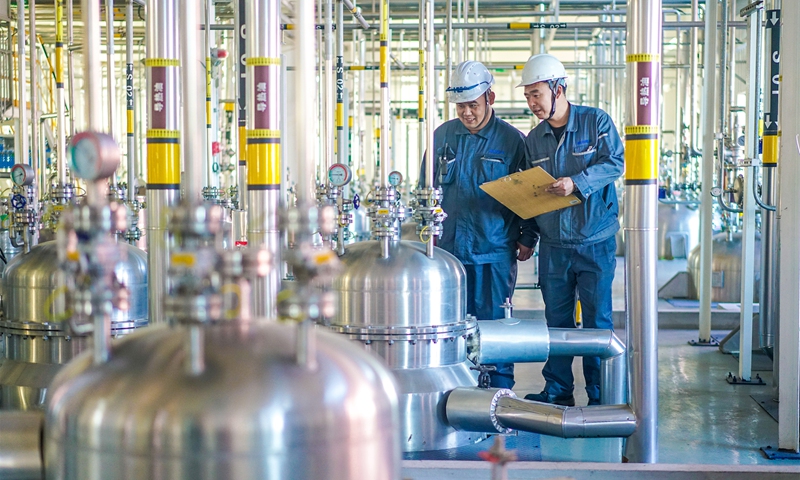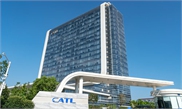COVID-19 flare-ups in E.China’s Zhejiang hit supply of key component for EV batteries

Workers inspect the automated production line in a lithium battery material workshop in Huzhou, East China's Zhejiang Province on November 25, 2021. Huzhou Kunlun Power Battery Material Co produces 15,000 tons of lithium battery electrolyte annually, with a value of nearly 500 million yuan ($78.3 million). Photo: VCG
Some producers of cobalt, a key component in lithium-ion batteries for electric vehicles (EVs), in East China's Zhejiang Province have suspended work due to recent COVID-19 flare-ups, pushing up the already high prices of the raw material in China.
Two cobalt salt plants in Zhejiang halted production on December 10, Ma Rui, an analyst with the Shanghai Metals Market (SMM), an industry news portal, told the Global Times on Thursday.
Their combined output of cobalt sulfate was about 700 tons in November, accounting for about 12 percent of the total supply of cobalt sulfate in China that month, while their combined output of cobalt chloride reached 600 tons, accounting for 14 percent of the total supply.
These proportions are relatively large, said Ma, noting that it's hard to tell when the two plants could resume production.
A representative of Zhejiang Huayou Cobalt Co, which is mainly engaged in the research, development and manufacturing of EV lithium battery materials, told the Global Times that its base in Quzhou, a city in the province, has not been affected by the flare-ups.
Prices of cobalt have been on the rise since December 10, increasing by 16,000 yuan ($2,514) per ton. The price of domestic electrolytic cobalt was 482,500 yuan per ton on Wednesday, an increase of 76 percent from the beginning of the year, and up 82.7 percent on a yearly basis, data from the SMM showed.
"Actually, the tight supply of imported cobalt and the robust market are the main driving forces behind the high prices," Yu Qingjiao, secretary general of the Zhongguancun New Battery Technology Innovation Alliance, told the Global Times on Thursday.
"The temporary suspension of some cobalt factories just added to the tight situation as spot inventories face more pressure," Yu noted.
Antaike, a Beijing-based consulting services provider for global nonferrous metals markets, said the influence of the suspension will continue for at least a month.
More than 80 percent of the cobalt raw materials used in China come from imports.
The pandemic in the Democratic Republic of Congo (DRC), the world's largest producer of cobalt, and rising freight costs have disrupted normal trade and thus caused tight supply, while domestic demand for EVs has been climbing, Yu said.
From January to November, China's new-energy vehicle (NEV) sales hit a record high of 3 million units, with the market penetration ratio up to 12.7 percent, data from the China Association of Automobile Manufacturers showed.
"It is estimated that for the whole year of 2021, NEV sales could reach 3.5 million units, meaning demand for battery materials like cobalt will continue going up," said Yu.
Ma said cobalt prices will continue rising for some time, and that's already being reflected in the costs of making EV battery cells.
The rapid rise in raw material prices has pushed up the cost of battery cells by more than 60 percent this year, according to a SMM report.
The domestic EV battery industry may have to increase prices to ensure the smooth completion of next year's production plan, while auto companies are likely to accept the upstream price hikes.

